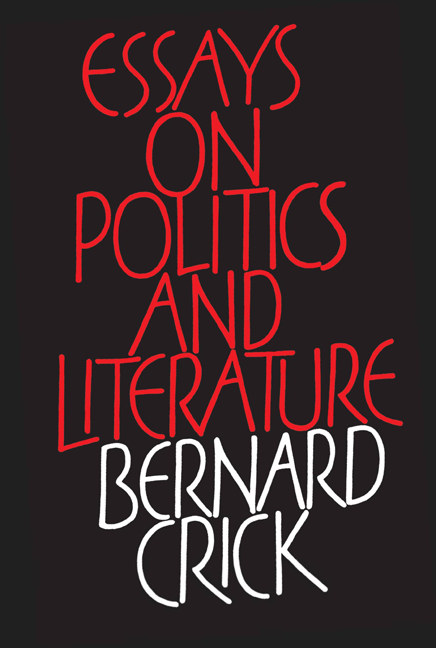Book contents
- Frontmatter
- Contents
- Preface
- Acknowledgements
- Foreword by David Daiches
- One Literature and Politics
- Two The Political in Britain’s Two National Theatres
- Three Young Writers of the Thirties
- Four Koestler’s Koestler
- Five Hannah Arendt: Hedgehog or Fox?
- Six Beatrice Webb as English Diarist
- Seven Words
- Eight My Lse
- Nine Reading The Observer as a Complex Text
- Ten On the Difficulties of Writing Biography and of Orwell’s in Particular
- Eleven Reading Nineteen Eighty-Four As Satire
- Twelve Animal Farm For Schools
- Thirteen Orwell and English Socialism
- Fourteen On the Orwell Trail
- Fifteen Wedekind’s Spring Awakening
- Sixteen Horvath’s Tales From the Vienna Woods
- Seventeen Pinter’s No Man's Land
- Eighteen Polly By Gaslight
- Nineteen Edgar Catches Jenkins’ Ear at the Barbican
- Twenty Barrault at the Barbican
- Index
Twelve - Animal Farm For Schools
Published online by Cambridge University Press: 24 September 2020
- Frontmatter
- Contents
- Preface
- Acknowledgements
- Foreword by David Daiches
- One Literature and Politics
- Two The Political in Britain’s Two National Theatres
- Three Young Writers of the Thirties
- Four Koestler’s Koestler
- Five Hannah Arendt: Hedgehog or Fox?
- Six Beatrice Webb as English Diarist
- Seven Words
- Eight My Lse
- Nine Reading The Observer as a Complex Text
- Ten On the Difficulties of Writing Biography and of Orwell’s in Particular
- Eleven Reading Nineteen Eighty-Four As Satire
- Twelve Animal Farm For Schools
- Thirteen Orwell and English Socialism
- Fourteen On the Orwell Trail
- Fifteen Wedekind’s Spring Awakening
- Sixteen Horvath’s Tales From the Vienna Woods
- Seventeen Pinter’s No Man's Land
- Eighteen Polly By Gaslight
- Nineteen Edgar Catches Jenkins’ Ear at the Barbican
- Twenty Barrault at the Barbican
- Index
Summary
Animal Farm is one of the most famous political satires ever written. Almost every British school child reads it, usually far too early to grasp all its meanings. Almost ten million copies have been sold in English language versions alone, and it has been translated into twenty-two foreign languages. Written specifically against Stalinism and what Orwell saw as the betrayal of revolutionary principles by the Communist Party of the Soviet Union, yet it also carries a general meaning of satire of tyranny in general, and satire at the pretensions of any ruling class to think they know better than those they rule what is best for them. So while written forty years ago, it still leaps to life wherever tyranny is imagined, feared or endured.
In Hungary, before the unseccessful revolt of 1956 against the Russians, two students, independently and unknown to each other, translated it and circulated secretly assawzzdai-illegal typed or duplicated copies. They compared their versions later in London. And more recently an Arab journalist emerged from a prison sentence in Tanzania, having spent his time turning Animal Farm into Swahili. Unfortunately he discovered that someone else had done it already.
In one part of the world, of course, it has not been received so well. Only ten years ago, following a BBC broadcast about Orwell, the Literary Gazette of Moscow commented bitterly:
Animal Farm is a malicious caricature of the Russian Revolution, which slanderously pictures the revolutionary people as a herd of animals. It was written in the days when Europe's fate was being decided on the Eastern Front, and when even the most hardened Conservative publishers could not bring themselves to publish a book that slandered their ally in the struggle against Fascism.
This was perhaps Orwell's greatest offence in the eyes not merely of Communists but of many democratic Socialists in Great Britain and elsewhere who still hoped that after the war a more democratic regime might emerge in Russia. These so-called ‘fellow travellers’, who went along with the Soviet Union, some with noble hopes and some with fatuous credulity, denounced Animal Farm as an attack on a war-time ally, at the best premature.
- Type
- Chapter
- Information
- Essays on Politics and Literature , pp. 166 - 191Publisher: Edinburgh University PressPrint publication year: 2020

